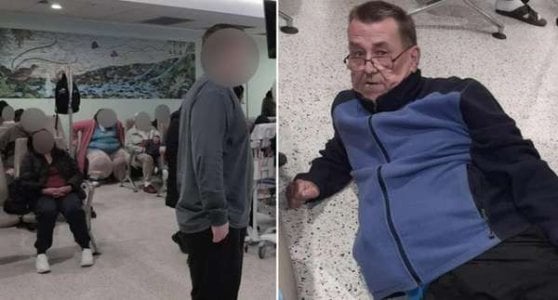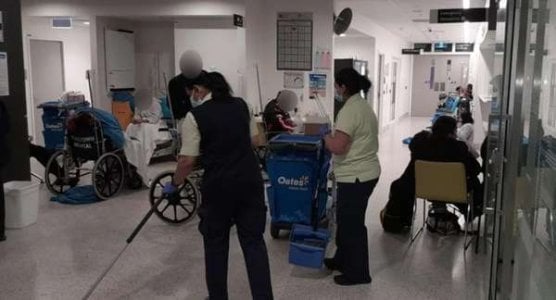Unbelievable: Senior spends nearly 19 Hours on hospital ER floor due to bed shortage
Living in the 21st century, we're fortunate to have access to advanced medical facilities and services.
It's hard to envision a world without healthcare resources readily available.
Yet, our faith in these services was challenged when we heard about Gary, a 57-year-old man forced to endure nearly 19 hours on the cold floor of a Sydney hospital emergency room.

Now you must be wondering what unfortunate events led Gary to such a predicament.
Believe it or not, it was due to a shortage of beds at Blacktown Hospital.
Gary was pointed towards the hospital around noon by his GP following a severe laceration on his leg.
But instead of receiving immediate care, he had to wait long into the following day.
The lack of available beds resulted in him spending the night on the cold, hard, and far-from-comfortable emergency room floor.
But the next day, at 6 am, he was still waiting to be admitted.
'I got here at midday yesterday to have a lacerated leg treated... but it's now 6 in the morning, and I'm still here waiting,' Gary revealed in his call to 2GB radio host Ben Fordham.
Gary added, ‘I was lying on the tiles because there's no bed. I got my own jumper and folded it up to make a pillow, but then I got a bit cold.’
According to his account, there were approximately 40 people in the overcrowded emergency department waiting room when he made the call.
Among them, ten individuals had been waiting for around 18 to 24 hours. Others have expressed their own frustrations with the healthcare system, with one person even calling it ‘disgraceful’.
Ben Fordham took to Facebook and asked in a post, ‘When did Australia become a third-world country? Our healthcare system certainly has.’
However, many replied and said this situation is ‘nothing new’.
Some individuals have observed that this issue has persisted for years, not only in New South Wales (NSW) but also in other Australian states.
Another person pointed out that it is a common problem even in Tasmania.
In August of the previous year, a tragic incident occurred when an elderly woman in her early 70s passed away after waiting nine hours for a hospital bed in Tasmania.

The growing pressure on healthcare facilities nationwide underscores the need for urgent attention and improvements to address these challenges.
The patient arrived in an ambulance at Launceston General Hospital but had to endure prolonged ‘ramping’ due to the overcrowded emergency department.
Ramping occurs when patients are made to wait inside ambulances because of overcrowding in emergency rooms, and this is a pressing issue faced by hospitals across the country.
Fordham criticised the state's fragmented healthcare system, emphasising that urgent action is needed from NSW Premier Chris Minns.
He pointed out, ‘You can't have someone sleeping on the floor of the emergency department coming up to 19 hours.’
In June, NSW Health Minister Ryan Park acknowledged the struggling hospital system and promised measures to mitigate the strain.
'We know patients can suffer when our emergency departments are overcrowded, and there are delays in the transfer of care from our paramedics to our hospital clinicians,' he said.
The government's solution thus far includes committing $175 million to recruit an additional 1200 nurses by 2027, implementing 25 Urgent Care Services, and introducing virtual healthcare services.
However, Gerard Hayes, Health Services Union NSW Secretary, felt the solution requires an improvement in employment conditions.
Attracting more health workers will lead to better healthcare, and in doing so, earnings and benefits must be more appealing.
He stated, ‘The best and fastest way to improve the hospital performance in NSW is by resolving the attraction and retention crisis.’

Let us not forget the importance of our collective voice in demanding change. Our healthcare system should reflect the advanced and compassionate society we strive to be.
How do you feel about the current state of healthcare in Australia, and what measures do you believe should be taken to address this problem? We'd love to hear your opinions and insights on this critical matter.
It's hard to envision a world without healthcare resources readily available.
Yet, our faith in these services was challenged when we heard about Gary, a 57-year-old man forced to endure nearly 19 hours on the cold floor of a Sydney hospital emergency room.

Gary, a Sydney man, endured an almost 19-hour wait in the waiting room of Blacktown Hospital's emergency department. Source: 2GB Sydney Radio.
Now you must be wondering what unfortunate events led Gary to such a predicament.
Believe it or not, it was due to a shortage of beds at Blacktown Hospital.
Gary was pointed towards the hospital around noon by his GP following a severe laceration on his leg.
But instead of receiving immediate care, he had to wait long into the following day.
The lack of available beds resulted in him spending the night on the cold, hard, and far-from-comfortable emergency room floor.
But the next day, at 6 am, he was still waiting to be admitted.
'I got here at midday yesterday to have a lacerated leg treated... but it's now 6 in the morning, and I'm still here waiting,' Gary revealed in his call to 2GB radio host Ben Fordham.
Gary added, ‘I was lying on the tiles because there's no bed. I got my own jumper and folded it up to make a pillow, but then I got a bit cold.’
According to his account, there were approximately 40 people in the overcrowded emergency department waiting room when he made the call.
Among them, ten individuals had been waiting for around 18 to 24 hours. Others have expressed their own frustrations with the healthcare system, with one person even calling it ‘disgraceful’.
Ben Fordham took to Facebook and asked in a post, ‘When did Australia become a third-world country? Our healthcare system certainly has.’
However, many replied and said this situation is ‘nothing new’.
Some individuals have observed that this issue has persisted for years, not only in New South Wales (NSW) but also in other Australian states.
Another person pointed out that it is a common problem even in Tasmania.
In August of the previous year, a tragic incident occurred when an elderly woman in her early 70s passed away after waiting nine hours for a hospital bed in Tasmania.

The situation is not isolated to one hospital but rather a broader issue faced by hospitals nationwide, with people waiting for hours in crowded waiting rooms. Source: 2GB Sydney Radio.
The growing pressure on healthcare facilities nationwide underscores the need for urgent attention and improvements to address these challenges.
The patient arrived in an ambulance at Launceston General Hospital but had to endure prolonged ‘ramping’ due to the overcrowded emergency department.
Ramping occurs when patients are made to wait inside ambulances because of overcrowding in emergency rooms, and this is a pressing issue faced by hospitals across the country.
Fordham criticised the state's fragmented healthcare system, emphasising that urgent action is needed from NSW Premier Chris Minns.
He pointed out, ‘You can't have someone sleeping on the floor of the emergency department coming up to 19 hours.’
In June, NSW Health Minister Ryan Park acknowledged the struggling hospital system and promised measures to mitigate the strain.
'We know patients can suffer when our emergency departments are overcrowded, and there are delays in the transfer of care from our paramedics to our hospital clinicians,' he said.
The government's solution thus far includes committing $175 million to recruit an additional 1200 nurses by 2027, implementing 25 Urgent Care Services, and introducing virtual healthcare services.
However, Gerard Hayes, Health Services Union NSW Secretary, felt the solution requires an improvement in employment conditions.
Attracting more health workers will lead to better healthcare, and in doing so, earnings and benefits must be more appealing.
He stated, ‘The best and fastest way to improve the hospital performance in NSW is by resolving the attraction and retention crisis.’
Key Takeaways
- An injured man named Gary had to wait almost 19 hours in the emergency room of Blacktown Hospital due to a lack of available beds.
- People have voiced their frustration at the healthcare system, with some likening it to that of a third-world country.
- NSW Health Minister Ryan Park says the state government recognises the issue and plans to hire more hospital staff and introduce measures to ease the strain on the healthcare system.
- Health Services Union NSW Secretary Gerard Hayes advocates for improving wages and conditions to attract and retain more health workers to improve hospital performance.
Let us not forget the importance of our collective voice in demanding change. Our healthcare system should reflect the advanced and compassionate society we strive to be.
How do you feel about the current state of healthcare in Australia, and what measures do you believe should be taken to address this problem? We'd love to hear your opinions and insights on this critical matter.







